
Plastic surgery vs. orthopedic surgery is one of the biggest debates among medical students interested in physiology. Both specialties allow you to explore the complex workings of the human body and use your skills to improve patient outcomes. However, they also have significant differences, such as the scope of practice, the work environment, and the training requirements.
How do you decide which one is right for you? In this article, we will provide helpful information and tips to help you make an intelligent decision on plastic surgery vs. orthopedic surgery and find a fulfilling career that matches your interests and abilities. We will also help you evaluate practical factors such as job availability, salary, and training duration.
Plastic Surgery vs. Orthopedic Surgery: Salary and Job Security
If you want to earn a lot of money and have a steady demand for your service, plastic surgery and orthopedic surgery are ideal specialties to consider. But be prepared for a competitive job market, even if you graduate from a prestigious program
Orthopedic surgery, meanwhile, offers more job openings. You can easily find a hospital that needs orthopedic surgeons, and the career outlook is positive. But orthopedic surgery also comes with some challenges, such as higher burnout, which we will discuss later.
According to recent data, plastic surgeons have the highest average annual salary among medical specialties at $619,000, while orthopedic surgeons earn slightly less with an average of $573,000.
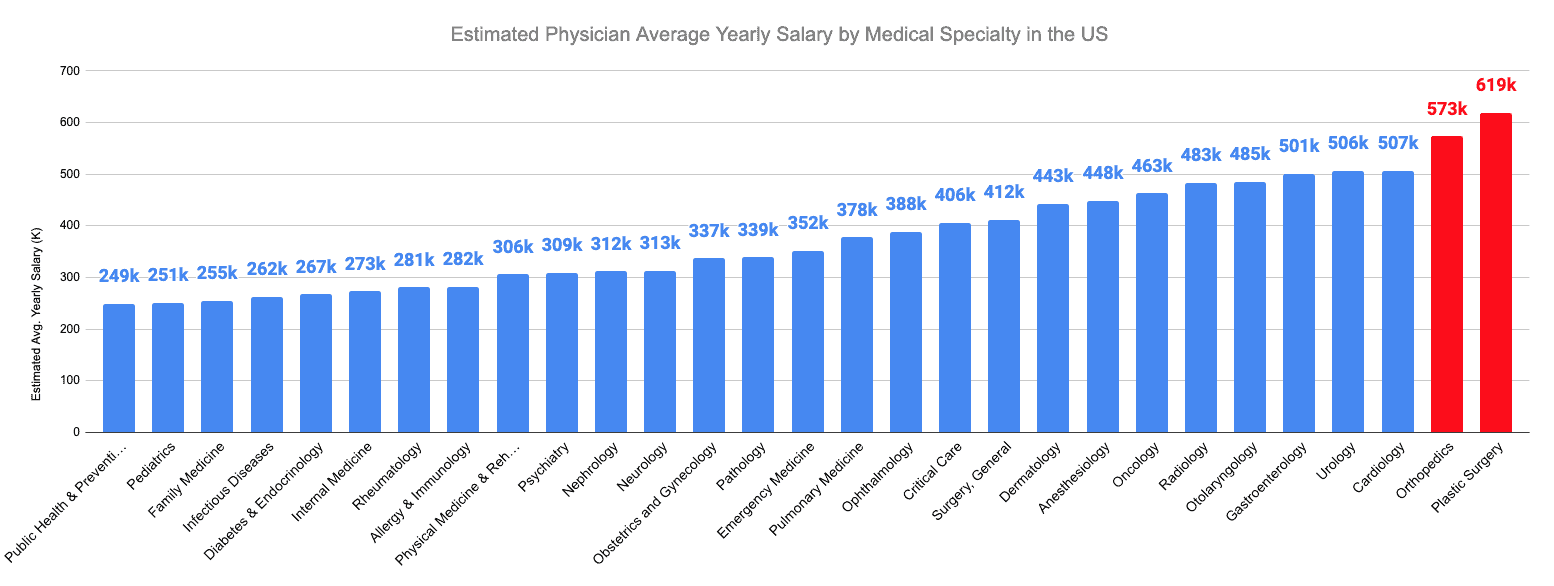
Plastic surgeons earn $619,000 per year on average, while orthopedic surgeons earn less with $573,000 annually
Plastic Surgery vs. Orthopedic Surgery: Competitiveness
Here we can assess the competitiveness of a specialty by looking at the unmatched rate – the % of people who apply and do not match into their preferred specialty. Among US seniors, orthopedic surgery had a 34.2% unmatched rate, making it highly competitive. In comparison, plastic surgery was the most competitive residency in the 2022 Match, with a 37.3% unmatched rate among US Seniors.
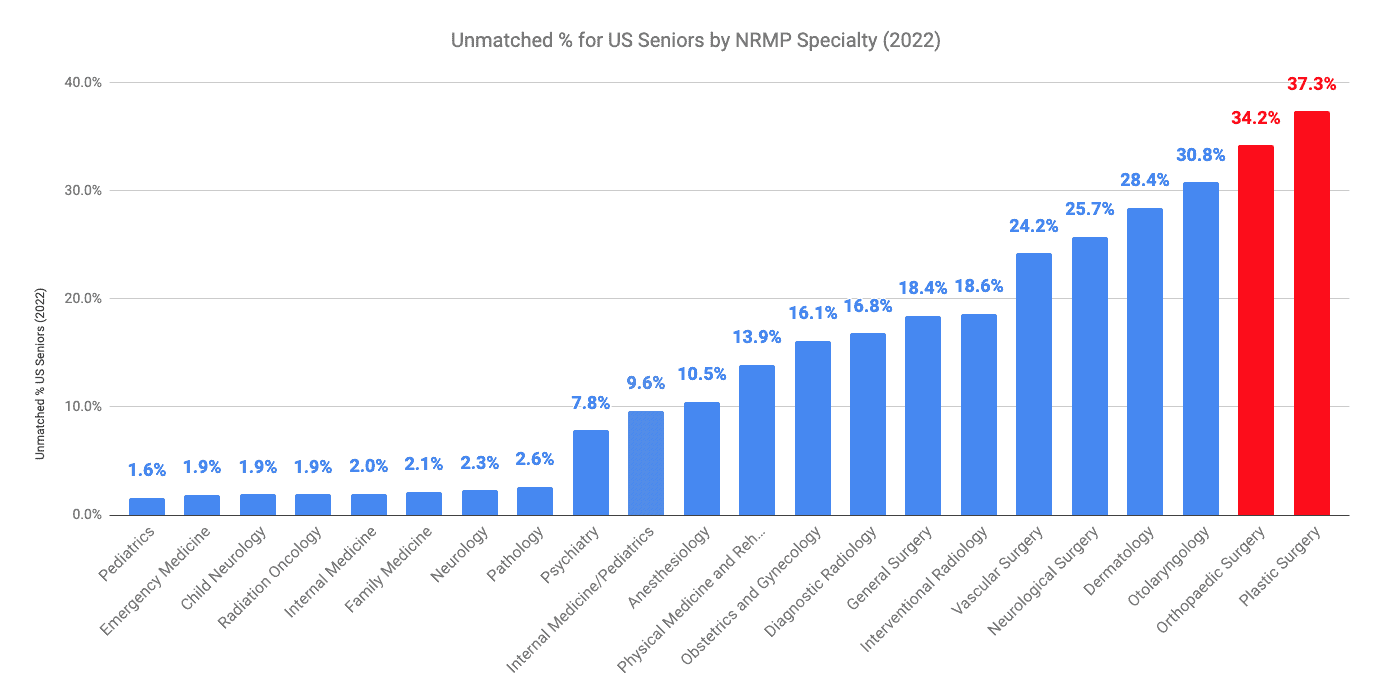
Orthopedic Surgery had a 34.2% unmatched rate, while plastic surgery had a 37.3% unmatched rate among US seniors
Training Path: Residency
Plastic surgery residency requires completion of a five to six-year residency program accredited by the Residency Review Committee for Plastic Surgery (RRC-PS). Orthopedic surgery involves a five-year orthopedic surgery residency.
An orthopedic surgery residency is typically slightly less competitive than a plastic surgery residency. Your USMLE scores, med school, and research are the main things for residency applications. Research is also a big thing for fellowship applications, and your residency program counts more, but your USMLE scores matter much less.
Plastic Surgery vs. Orthopedic Surgery: Work-Life Balance
Work-life balance is a crucial factor for many medical professionals. Both plastic surgeons and orthopedic surgeons have demanding schedules with long hours and on-call responsibilities. They may work long hours in the operating room and be on-call for emergencies such as trauma or burn accidents.
On average, plastic surgeons and orthopedic surgeons work 52.2 and 52.9 hours per week, respectively, ranking them in the middle of medical specialties.
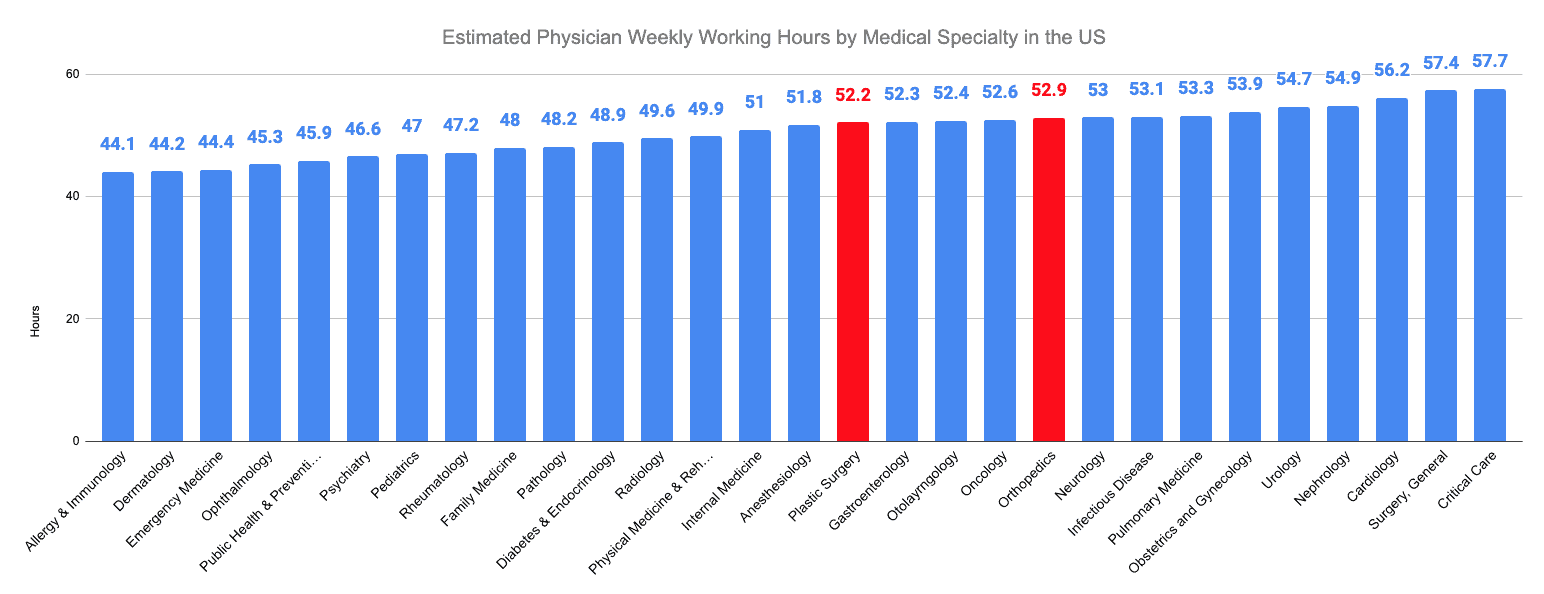
Plastic surgeons work an average of 52.2 hours per week, while orthopedic surgeons work slightly more hours, at 52.9 per week.
Plastic surgeons spend an estimated 11 hours per week on administrative paperwork tasks, such as documenting pre- and post-operative notes and taking photographs. In comparison, orthopedic surgeons spend 14 hours per week, ranking near the middle of all medical specialties.
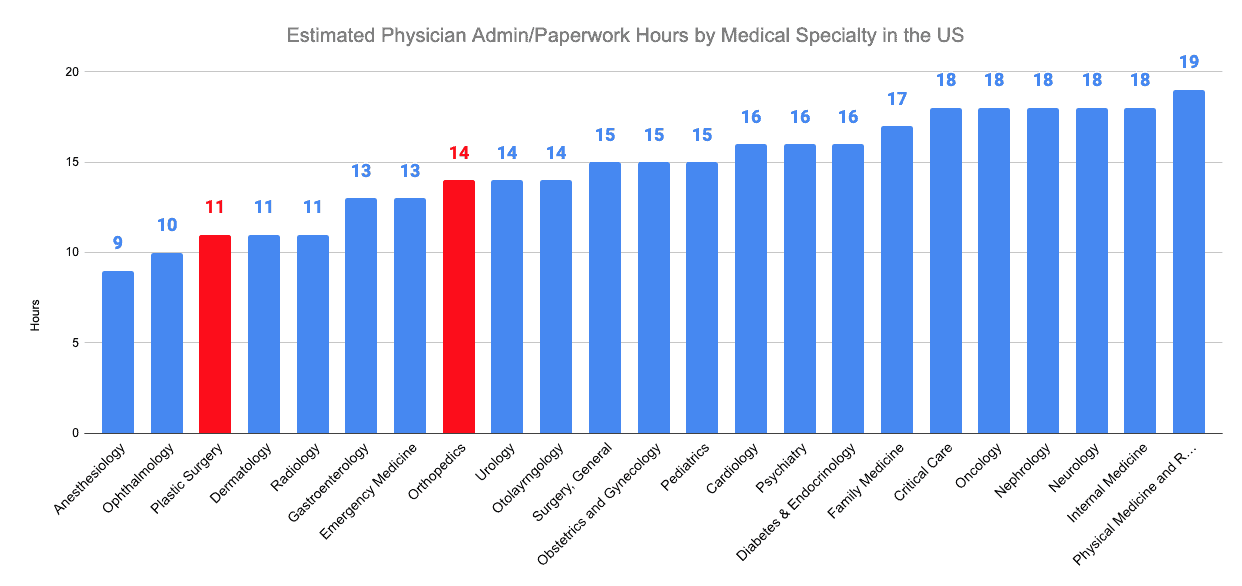
Plastic surgeons work on admin/paperwork an average of 11 hours per week, while orthopedic surgeons work more hours, at 14 per week.
Training Duration and Subspecialties
The training duration is a key aspect to consider when choosing between plastic surgery vs. orthopedic surgery. Orthopedic surgery has a five-year training period, while plastic surgery has a minimum of five to six-year residency program.
After completing a plastic surgery residency program, some surgeons may choose to pursue additional fellowships to further specialize in a particular aspect of plastic surgery. This can increase the length of your plastic surgery training.
Plastic Surgery vs. Orthopedic Surgery: Job Satisfaction and Burnout Rates
Job satisfaction plays a significant role in career fulfillment. According to various studies, both plastic surgeons and orthopedic surgeons tend to have high job satisfaction rates, with many professionals expressing contentment with their career choice and would choose it again if given the chance.
Plastic surgery ranked at the upper end of all medical specialties with 97% of plastic surgeons stating that they would choose the same specialty again, while orthopedic surgery ranked slightly lower with 95% of orthopedic surgeons feeling the same way.
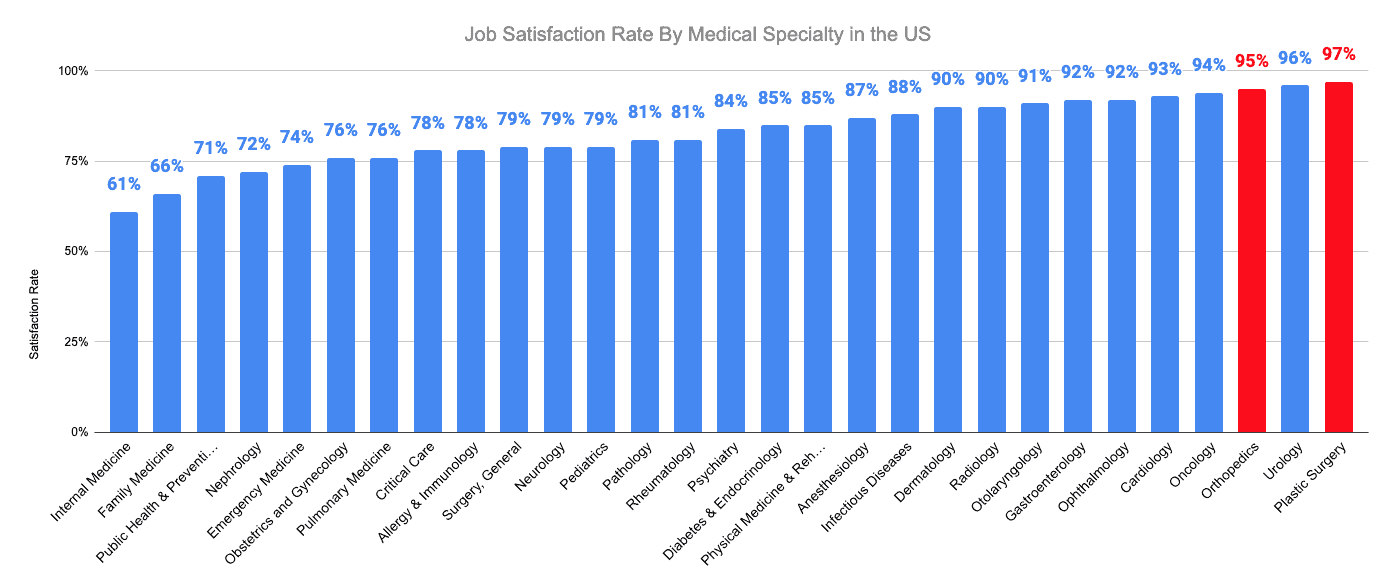
Plastic surgeons reported a 97% job satisfaction rate, while orthopedic surgery reported slightly lower satisfaction with 95%
That being said, the burnout rates for plastic surgery and orthopedic surgery were both 46% and 45% respectively, ranking near the lower end of all medical specialties.
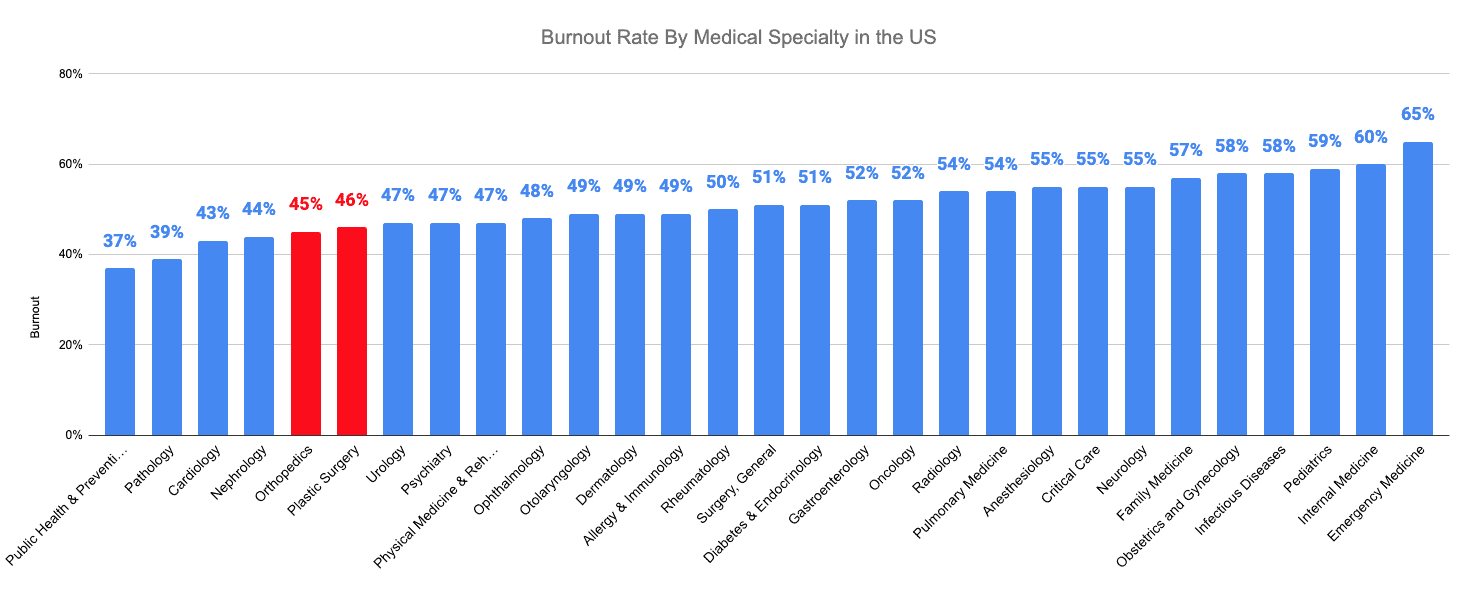
Plastic surgeons have a burnout rate of 46%, while orthopedic surgeons have a slightly lower burnout rate of 45%.
Plastic Surgery vs. Orthopedic Surgery Comparison
To provide a visual overview, here’s a table comparing plastic surgery and orthopedic surgery:
| Aspect | Plastic Surgery | Orthopedic Surgery |
|---|---|---|
| Average Salary | High income, especially in specialized areas like reconstructive or cosmetic surgery | High but generally lower than plastic surgery |
| Job Security | Stable field with availability of both reconstructive and cosmetic procedures | Stable field due to aging population and accident/sports injuries |
| Training Path | Typically involves 5-6 years of plastic surgery residency | Typically involves 5 years of orthopedic surgery residency |
| Lifestyle | Generally predictable work schedule and increased opportunities for time off, but may involve on-call responsibilities for trauma or burn cases | More predictable work schedule and increased opportunities for time off, but involve on-call responsibilities for trauma or accident cases |
| Administrative Paperwork | Low to Moderate documentation requirements for patient records and surgical plans | Moderate administrative requirements. |
| Job Satisfaction | Generally high, satisfaction tied to successful surgeries and patient outcomes | Slightly lower |
| Burnout Rates | Low to Moderate, depending on the workload and stress associated with surgical procedures | Low to Moderate |
| Personality | Requires creativity, precision, and good communication skills, attention to aesthetics | Strong analytical skills, attention to detail, ability to handle stress and pressure |
Please note that this table serves as a general comparison. To determine the most suitable career for you, consider your personal and career priorities and goals.
Concluding Thoughts
Choosing the right specialty between plastic surgery vs. orthopedic surgery depends heavily on your priorities. To determine this, try reverse engineering your ideal life and identify your top priority. A helpful exercise is to write down the top five things you want to achieve in your career and personal life. Knowing these priorities will make finding a career that aligns with them easier. Often, the biggest obstacle is not a lack of knowledge about different fields but a lack of self-awareness about our own preferences.







